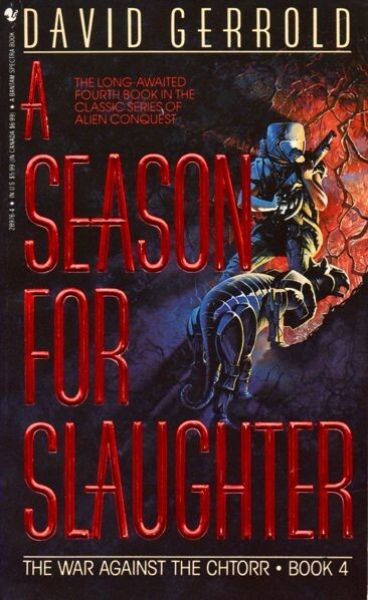Rose Garden Dreams
A Season for Slaughter (The War Against the Chtorr, volume 4)
By David Gerrold

15 Sep, 2021
1993’s A Season for Slaughter is the fourth and latest volume in David Gerrold’s as yet unfinished War Against the Chtorr series.
Having survived endless struggle against the alien ecosystem displacing Earth’s native life, Jim McCarthy contends against an unexpected menace: French Canadians1!
Or rather, a French Canadian, in the form of Quebecois officer Major Robert E. Bellus, who is accompanying Jim on a field mission into deepest Mexico. Bellus’ inclination to interfere in the activities of his betters is matched only by his incompetence, leaving Jim no choice but to exploit Bellus’ ignorance and cowardice to bully the useless man into ceding his authority over Jim.
Bellus has been humiliated; the humiliation is public. This achieves Jim’s immediate goals but will make his future career even more difficult. This is a pattern for Jim: doing something he thinks important at the cost of pissing off people over him in the chain of command. While in this case, the President finds Bellus’ humiliation funny, Jim will not always enjoy that sort of protection from the consequences of his actions.
When he is not making powerful enemies, Jim and his fellow soldiers conduct field research into the Chtorran ecology. This produces useful information. They now know how Chtorran lifeforms managed to reach Earth, albeit far too late to do anything about it. They have learned something of the role that sound plays in Chtorran social regulation. The cost for this knowledge? Irate officers will attempt to sabotage Jim; America-hating nations like Brazil see the research as yet more American imperialism.
Nevertheless, Jim not only survives his frequent setbacks. (something many of his teammates cannot say), he prevails. Despite this, the larger goal — exterminating the invasive ecology — remains out of reach.
~oOo~
Readers who like the ecological aspect of this series will be pleased to know there are extensive notes on Chtorran lifeforms throughout the book. One could just skip past the narrative sections if one wanted to. I often wanted to.
I did not like A Season for Slaughter. One reason: I recoiled from the incessant American jingoism. Foreign characters are there to be jealous of and hostile towards America, to make foolish decisions, and to be ignored or outmaneuvered as appropriate. The era when this book was written and published may explain this xenophobia. Americans had suffered decades of humiliating military setbacks (and later in the year would experience yet another one in Mogadishu), so a story in which Americans show those foreigners what’s what might have appealed to American readers. A quick glance at Goodreads suggests at least one reader approved.
Another reason: length. The first edition of A Matter for Men is 397 pages. A Day for Damnation is 382 pages. A Rage for Revengewas 517 pages. A Season for Slaughter is 562 pages long. More things happen in the later volumes than the earlier ones. However, events are not the same thing as plot. The last two novels could have been pruned down to 400 hundred pages each without losing much of value.
I’m guessing that Gerrold kept coming up with cool new ideas while he was writing and could not resist the temptation to stuff them into the series. But … unless one is willing to structure one’s series so the plot converges towards resolution, series may instead spiral out of control, with no end point within reach. It’s a common enough pattern: one sees it in The Final Dangerous Visions and A Song of Ice and Fire. No doubt there are other examples, of which I will be informed in comments.
As far as I can tell, A Season for Slaughter is out of print.
1: Here’s an irrational prejudice of mine. French Canadians or at least those found within Quebec impact Canadian politics on a national level. Therefore, I feel entitled to poke fun at them for their absurd moments, just as they could mock Ontario for making Toronto’s worst mayor’s brother Premier. However, Americans don’t have standing or sufficient information to mock Quebec and it annoys me when they do.
At least Gerrold does not, as another American did, insist Quebec was Vichy during the war.
